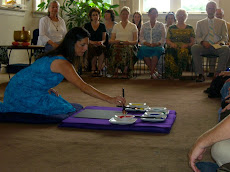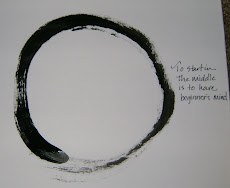When does ritual cease being ritual?
Thought #1:
When it merely becomes routine or - worse - rut.
If the meaning and purpose dwindle, ritual is no longer ritual.
Just like romance, how does one keep the flame burning when it comes to ritual?
Or, Thought #2:
If greater good comes from simply participating in ritual, then is the ritual simply routine (or rut) or is it a service (which indeed has purpose and meaning)?
Mother Teresa lost her faith for fifty years and still kept "acting as if," and her life, and the lives she affected, was full of purpose, care, and meaning - in the name of faith, in the name of service.
This question just popped up for me this morning. I would like to explore it further, but I am going to let it sit for awhile and brew.
Another thought that popped into my head was Tevye's line from Fiddler on the Roof (music by Jerry Bock, lyrics by Sheldon Harnick, book by Joseph Stein), where he says after the opening song. Tradition, "Without our traditions, our lives would be as shaky as - as a fiddler on the roof!" I was thinking the same could be said for personal and community rituals.
"On the other hand," (as Tevye would say) are rituals really necessary for stability and groundedness ("centering" and balance)? What about the people who don't practice rituals? Are their lives out of whack? Disconnected? Lacking community and compassion?
On the other hand, rituals can help, and do create a sense of connection. They can and do foster compassion. They can and do bond community unity.
More for me to ponder.
This morning, I printed out all of the blog posts I had written thus far. There's a lot of good "stuff," and then, of course there's a lot of not-so-great "stuff." However, as a ritual - one I have attended to almost daily since January 9 - it has been immensely purposeful, meaningful, and practical for my inner work and helping me get clarity in working on my thesis.
I remember hearing Frank M. say at an AA meeting once, "Faith is practical." I think that's true. And I would also say, structure is practical. The structure of this blog has kept me accountable (and, to be sure, so has my ego: "What will they think i f I miss a post?"...My ego being "my readers," the other ego being that I think I have readers who are reading this daily). Accountable, to myself and to my thesis work.
Blogging has also kept me connected: connected to my thesis (especially on days and even weeks when I haven't been able to read, write, or organize much), connected to my thoughts, ideas, and feelings, and connected to community of people who actually do read this thing. Mary Pipher says in her book, Writing to Change the World, "[Blogs] are tangible manifestations of the central fact of the universe: Everything is connected" (p. 221).
Blogging has reminded me to be compassionate, particularly towards myself: when I am tired or under the weather, when I've had a day where I've "tripped up," writing about it allows me to see these things for what they are, and let them go. If I write that I'm tired, bordering on exhausted - I put it down on virtual paper and go get rest. If I'm out of ideas, I write that I'm tapped, or turn my post over to something else (i.e. my min-tribute to George Harrison).
I also have a classroom blog that I use as a communication tool between my parents and students. This blog definitely serves my classroom community and keeps us connected. Daily, I post homwework; Weekly, I post a narrative of what's been going on in our classroom; Whenever I can, I post photos of my students and some of their work (poems, journal entries, art pieces); Whenever necessary, I post announcements. It is through the blog that my parents can always check in to see what is going on in Room 503 (my classroom), my students log on to enjoy photos and check any assignments they may have forgotten to write down, and it is a forum for me to articulate what we have been doing, reflect on what has been going on during the week, and communicate daily with my students' parents. "With blogs, we can build I-thou relationships...Over time, blogs will continue to connect us, teach us empathy, and perhaps even save us from ourselves" (Pipher, 2006, p. 221).
Th-th-that's all for now, folks!
Lizard Coloring Page
2 years ago





No comments:
Post a Comment